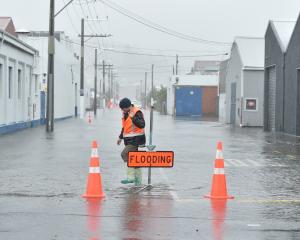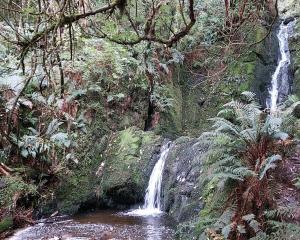It has already been a big year for Guy Ryan, the 2015 Young New Zealander of the Year. What a contrast to the bleakness he felt just 12 months ago, writes Bruce Munro.
Guy Ryan is seated at a small table in the Otago Museum cafe. He is next to the glass wall, beyond which trees in vivid autumn livery provide a pleasant, soothing backdrop. But Mr Ryan's eyes are locked on the laptop in front of him, his fingers tapping keys, making the most of a few empty moments to get an extra task or two done.
It has been a frantic six weeks since he was named 2015 Young New Zealander of the Year. The approaches from national and global organisations proffering partnership have been unexpectedly frequent; the requests for him to speak, a deluge.
''It's been a huge month ... quite humbling, but also quite intense,'' Mr Ryan says.
''I want to be grateful and make the most of the opportunities. But I'm also wanting to get some head space, so I can get crystal clear on where we want to be by the end of 2017.''
Diners overhearing the comments might wonder at them coming from such a fresh face. But this smiling, youthful 29 year old is the founder and chief executive officer of Inspiring Stories Trust, a rapidly growing organisation cultivating young change makers while also making its own waves here and overseas.
The flywheel has momentum now. But this time last year, the wheels of the trust looked like they were about to fall off.
Mr Ryan struggles to pinpoint the lowest point of that episode. Perhaps it was sitting with board members as they questioned the ongoing viability of the national trust he created in Dunedin in 2011.
Maybe it was a few weeks earlier, when he stood in his Wellington office, open mouthed at news the New Zealand Film Commission had abruptly cut all funding for the trust's youth film programmes.
Or it could have been in the quiet, solitary moments when he felt the full weight of his and others' tattered reputations heavy on his shoulders should he decide to keep going but fail.
During those weeks in March and April last year, when everything hung in the balance, more than once Mr Ryan reflected on what he was attempting, why, and where it all began.
Born north of Westport in the small West Coast village of Granity, Mr Ryan's humble family home was wedged between steep bush covered hills and the tempestuous Tasman Sea. It was the sort of upbringing where you made your own fun.
''I was always being encouraged by my parents and grandparents to be creative and explore,'' he recalls.
At 12, he was given a surfboard. Surfing became an abiding passion. It also taught him valuable lessons in risk taking.
By the time he came to Dunedin to study marketing and design at the University of Otago, he was a creative, entrepreneurial young man without much sense of direction.
''I was a kind of run of the mill delinquent kid as a teenager. When I got to university, I was partying up pretty hard for the first few years.''
But he liked to engage with ideas. And the ideas to which he was being exposed, such as anthropogenic climate change, had a broadening, deepening effect.
''That was really the first time I had learnt about climate change and how serious it was. The fact our leaders had known about it for 30 years and not done a thing made me feel sick and frustrated. That was certainly a trigger.''
After undergraduate studies, Mr Ryan was in the first intake for the university's master of science communication course.
A 25 minute film made by Mr Ryan and fellow student Nick Holmes, documenting four youth led environmental community projects, was runner up for best New Zealand film at the 2010 Reel Earth Environmental Film Festival and won awards at two international film festivals.
The next year, with funds from a Vodafone World of Difference award, Mr Ryan launched Inspiring Stories Trust. Out of a cramped, second storey office in Princes St, Dunedin, he began putting into action his dream of a world where young people collaborated to solve real world problems.
For three consecutive years, he and an ever changing team conducted nationwide road trips to connect young film makers and young change makers, and then screen the resulting inspirational short films throughout the country.
Each road trip culminated in a Festival for the Future, giving innovative young people a platform to share their ideas for a better New Zealand.
Held in Wellington to start with, and in Auckland last September, Festival for the Future is now the most significant national event of its type.
In 2012, his board of trustees counselled him to shift to Wellington, to follow his dream and his heart. It made sense for a national organisation to be based in the capital. Besides which, his partner (and now wife) Michelle was moving there for a job.
Inspiring Stories Trust was aiming high and gaining altitude, powered by Mr Ryan's vision and an enthusiastic mix of dozens of volunteers, interns and contracted personnel.
At the end of 2013, the first Live the Dream was held. This 10 week full time social enterprise accelerator attracted seven early stage youth led ventures.
''Participants come in with their idea for a better New Zealand. And then we wrap around that some of New Zealand's most brilliant minds from the commercial, environmental and social sectors _ mentors, speakers, facilitators,'' Mr Ryan says.
That first accelerator programme had not attracted as much funding as he had hoped. Mr Ryan, however, felt strongly that it should proceed. So, funding was topped up from trust reserves.
Then, just as the accelerator pilot finished, the bombshell: all of the Film Commission's funding for the trust's film based programmes was being cut.
''Even though we'd developed an enterprise model and there was a trajectory where our film focused programmes could stand on their own two feet ... That was really hard.''
In one stroke, a sizeable portion of the trust's funding, and an equal chunk of its programmes, disappeared.
With less than $500 in the bank, they vacated their premises and became squatters, sharing space with a generous fellow not for profit. Mr Ryan's board members were an encouraging sounding board. They were concerned, but allowed him to make the final decision on whether to keep fighting or walk away.
''I was feeling pretty gutted. It was very bleak,'' Mr Ryan admits.
Most people would have shut up shop. Not least because perseverance would quite possibly only delay failure's arrival.
''As well as my personal reputation if things had folded, it would have reflected quite badly on the trustees as well. It was risking reputations, and debt, and relationships the trust had built up.''
But in the end, he chose determined grit.
''I felt we had come so far. And what we were doing, I felt it was what New Zealand needed at this time.
''I felt absolutely that the work we were doing was important, and I wasn't prepared to just walk away from it.''
What a difference a year makes.
''It's made us much leaner, more resourceful and resilient,'' Mr Ryan says.
The trust's vision remained the same, but its focus shifted from film to social enterprise.
''We're still looking closely at the journey from inspiration to action. How, on a much larger scale, do we support young New Zealanders to explore issues that affect our future: social, environmental, economic?
''How do we support young people to grow ideas that can make a big difference for their communities, for New Zealand and beyond? And how do we help them take it from ideas, to proof of concept, to scale?''
September's Festival of the Future brought together 400 young movers and shakers. The most recent Live the Dream was held in Wellington and Auckland, with a total of 18 early stage, youth led social enterprises getting the 10 week accelerator treatment.
During the past four years, almost 5000 young New Zealanders have been directly involved in the trust's programmes. Young people such as the Dunedin based team working on a social enterprise called Liveable that is finding ways to raise the standard of rental accommodation.
Or, like 18 year old Bonnie Howland, of Wellington, who is in the process of bringing to market an organic mascara as a means of raising funds for the Pacific nations eyesight restoration work of the Fred Hollows Foundation.
Then, in February, came the breakthrough, a $500,000 grant from the Government's Youth Social Enterprise Fund.
''It's catalytic for us,'' Mr Ryan says.
''It's 10 times the size of any previous single chunk of funding we have had.''
Less than a week later, at a gala event in Auckland, surrounded by family, friends, staff and mentors, he was named 2015 Young New Zealander of the Year.
For a rare moment, Mr Ryan had nothing to say.
''My name being read out was quite shocking actually.
''It was just the emotion of the occasion, being in the company of trustees and family who have shared this journey with us. And being in the presence of such incredible people who are all doing amazing things for New Zealand.''
For the past six weeks, everything has been moving with dizzying speed. Mr Ryan has been invited to speak at the Social Enterprise World Forum, in Milan, at the start of July.
He will be a member of a high powered panel which will include Nobel Peace Prize recipient Muhammad Yunus, the Bangladeshi social entrepreneur who pioneered microcredit and microfinance.
Businesses such as Google, Kiwibank and Air New Zealand have contacted the trust, keen to talk about possible partnerships.
''It's pretty jaw dropping. I cannot believe this is happening,'' Mr Ryan says.
At last, he is able to plan with certainty for a period longer than a few months.
Later this year, he intends to launch the Future Fund to help young social entrepreneurs.
As well as staging what he hopes will be the country's largest crowdfunding campaign, Mr Ryan plans to establish the endowment fund with five year interest free loans of $2 million each, given by five ''high net worth individuals''. The trust will invest the money and use the interest to help social enterprises get on their feet.
''We have urgent and complex local and global problems that need solving: social, environmental and economic,'' he says.
''There is no silver bullet answer. We need, more and more, to nurture brilliant minds who will talk and work together to create solutions.
''In the 20th century, entrepreneurship was about making money. In the 21st century entrepreneurship has to be about social and environmental impact as well as growing ventures that feed the economy and create livelihoods.''












